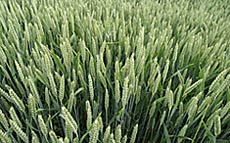Agrimetrics: how Big Data will help solve global food problems
Release Date 26 October 2015

Farmers' profits, rural biodiversity, and consumer choice could all improve significantly by sharing data about the food system.
That's the aim of Agrimetrics - the world's first big data centre of excellence for the entire food chain, which is officially launched at its new headquarters in Hertfordshire today (26 October) by the UK government ministers for farming and life sciences.
Recent food controversies, such as food poisoning caused by chicken, low dairy prices, and farming practices that damage Britain's bees, could all be improved if producers, processers and retailers shared and analysed data more efficiently, Agrimetrics leaders say.
Unlike other big data centres, Agrimetrics will use data from across the entire food system - including government, supermarkets, farmers, consumers and elsewhere - to provide significant improvements to food markets. This would help iron out uncertainty, ensuring Britain and the world has a secure supply of available and affordable food, while reducing financial and environmental costs.
Agrimetrics will be independent of government and big business, while using expertise from within UK universities and research centres, principally Rothamsted Research, the University of Reading, the National Institute of Agricultural Botany (NIAB) and Scotland's Rural College (SRUC).
Professor John Crawford, interim Chief Executive Officer (CEO) of Agrimetrics, commented: "We are delighted to have been awarded £11.8m from UK Government, through Innovate UK and the Agri-tech Strategy, for the establishment of the Centre, which has been designed in consultation with more than 50 organisations from industry and academia and now has in excess of 190 companies engaged".
Professor Richard Tiffin, University of Reading, Scientific Director of Agrimetrics, added: "Today's food and farming sector faces unprecedented challenges. A billion people worldwide are obese, while another billion go to bed hungry. Dairy farmers are paid less for their milk than it costs to produce it. Long-term sustainability is sacrificed for short-term profit.
"The food system has become so complex it is beginning to resemble the world of finance, yet the stakes are even higher - when the food system crashes, people starve. Markets always work better with more information. That's the role we aim to play in the food system."
George Eustice MP, Minister of State for Farming, Food and the Marine Environment, and George Freeman MP, Parliamentary Under Secretary of State for Life Sciences, officially launched Agrimetrics at its headquarters in Harpenden, Herts, today.
Farming Minister George Eustice said: "British farmers are increasingly making use of data to help them manage and grow their business, from predicting weather trends, to assessing soil qualities and using the very best feed types. This new technology has contributed to efficiency gains and will help us drive up the value of our food and farming industry, already worth £100 billion to our economy.
"This new centre, funded as part of the government's Agri-Tech Strategy, provides even greater opportunities to utilise this valuable resource. Taking ideas from the laboratory to the farm and improving productivity of farming is all part of our ambitious long-term vision for the future of farming".
Agrimetrics was designed after consulting 50 organisations from science and industry and is already working closely with more than 100 others. The Centre is beginning to put its first projects into practice and is also seeking further collaborations.
At the core of Agrimetrics is a data science and modelling platform to improve access to data for the agri-food sector. It will enable the delivery of new products by industry partners that will draw on a much wider range of data than has previously been possible.
The headquarters of the Centre are at the Lawes Open Innovation Hub, at the Rothamsted Centre for Research and Enterprise in Harpenden. The University of Reading will host the data science infrastructure, and NIAB and SRUC will provide national coverage and knowledge exchange.
Professor Tiffin added: "Only by engaging with partners throughout the food system can the challenges which confront us be tackled. Farmers need to be able to farm smarter in order to raise productivity, supermarkets need to be able to ensure that they are sourcing safe and sustainable food, and the food system as a whole needs to reduce waste.
"By using data to better connect farmers to food consumers, the system can become more responsive, so that everyone benefits."
